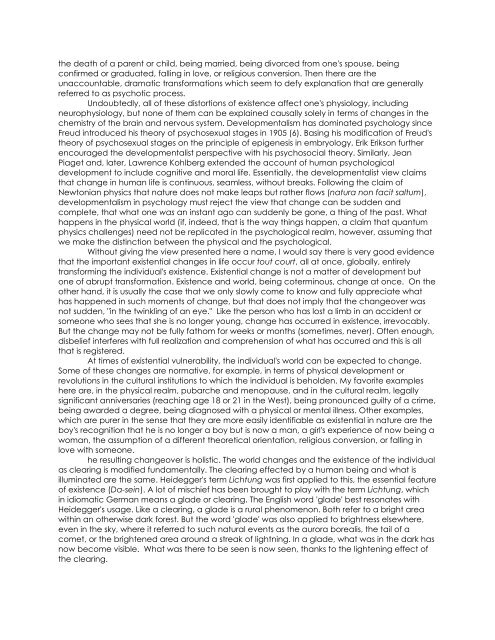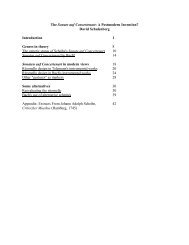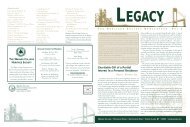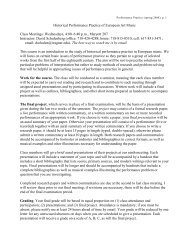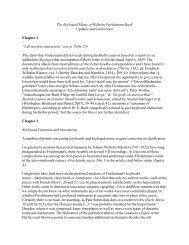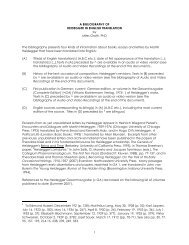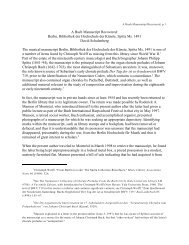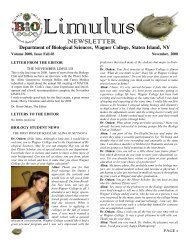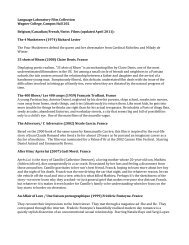SEVEN PAPERS ON EXISTENTIAL ANALYSIS ... - Wagner College
SEVEN PAPERS ON EXISTENTIAL ANALYSIS ... - Wagner College
SEVEN PAPERS ON EXISTENTIAL ANALYSIS ... - Wagner College
Create successful ePaper yourself
Turn your PDF publications into a flip-book with our unique Google optimized e-Paper software.
the death of a parent or child, being married, being divorced from one's spouse, being<br />
confirmed or graduated, falling in love, or religious conversion. Then there are the<br />
unaccountable, dramatic transformations which seem to defy explanation that are generally<br />
referred to as psychotic process.<br />
Undoubtedly, all of these distortions of existence affect one's physiology, including<br />
neurophysiology, but none of them can be explained causally solely in terms of changes in the<br />
chemistry of the brain and nervous system. Developmentalism has dominated psychology since<br />
Freud introduced his theory of psychosexual stages in 1905 (6). Basing his modification of Freud's<br />
theory of psychosexual stages on the principle of epigenesis in embryology, Erik Erikson further<br />
encouraged the developmentalist perspective with his psychosocial theory. Similarly, Jean<br />
Piaget and, later, Lawrence Kohlberg extended the account of human psychological<br />
development to include cognitive and moral life. Essentially, the developmentalist view claims<br />
that change in human life is continuous, seamless, without breaks. Following the claim of<br />
Newtonian physics that nature does not make leaps but rather flows (natura non facit saltum),<br />
developmentalism in psychology must reject the view that change can be sudden and<br />
complete, that what one was an instant ago can suddenly be gone, a thing of the past. What<br />
happens in the physical world (if, indeed, that is the way things happen, a claim that quantum<br />
physics challenges) need not be replicated in the psychological realm, however, assuming that<br />
we make the distinction between the physical and the psychological.<br />
Without giving the view presented here a name, I would say there is very good evidence<br />
that the important existential changes in life occur tout court, all at once, globally, entirely<br />
transforming the individual's existence. Existential change is not a matter of development but<br />
one of abrupt transformation. Existence and world, being coterminous, change at once. On the<br />
other hand, it is usually the case that we only slowly come to know and fully appreciate what<br />
has happened in such moments of change, but that does not imply that the changeover was<br />
not sudden, "in the twinkling of an eye." Like the person who has lost a limb in an accident or<br />
someone who sees that she is no longer young, change has occurred in existence, irrevocably.<br />
But the change may not be fully fathom for weeks or months (sometimes, never). Often enough,<br />
disbelief interferes with full realization and comprehension of what has occurred and this is all<br />
that is registered.<br />
At times of existential vulnerability, the individual's world can be expected to change.<br />
Some of these changes are normative, for example, in terms of physical development or<br />
revolutions in the cultural institutions to which the individual is beholden. My favorite examples<br />
here are, in the physical realm, pubarche and menopause, and in the cultural realm, legally<br />
significant anniversaries (reaching age 18 or 21 in the West), being pronounced guilty of a crime,<br />
being awarded a degree, being diagnosed with a physical or mental illness. Other examples,<br />
which are purer in the sense that they are more easily identifiable as existential in nature are the<br />
boy's recognition that he is no longer a boy but is now a man, a girl's experience of now being a<br />
woman, the assumption of a different theoretical orientation, religious conversion, or falling in<br />
love with someone.<br />
he resulting changeover is holistic. The world changes and the existence of the individual<br />
as clearing is modified fundamentally. The clearing effected by a human being and what is<br />
illuminated are the same. Heidegger's term Lichtung was first applied to this, the essential feature<br />
of existence (Da-sein). A lot of mischief has been brought to play with the term Lichtung, which<br />
in idiomatic German means a glade or clearing. The English word 'glade' best resonates with<br />
Heidegger's usage. Like a clearing, a glade is a rural phenomenon. Both refer to a bright area<br />
within an otherwise dark forest. But the word 'glade' was also applied to brightness elsewhere,<br />
even in the sky, where it referred to such natural events as the aurora borealis, the tail of a<br />
comet, or the brightened area around a streak of lightning. In a glade, what was in the dark has<br />
now become visible. What was there to be seen is now seen, thanks to the lightening effect of<br />
the clearing.


